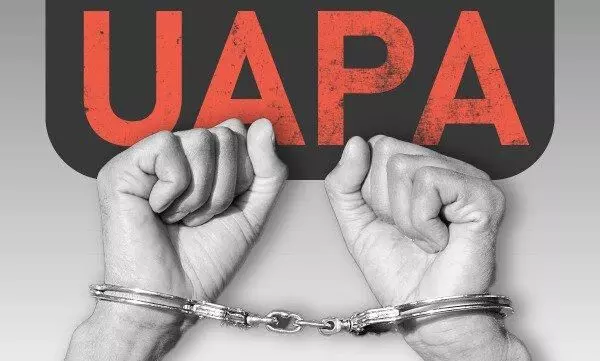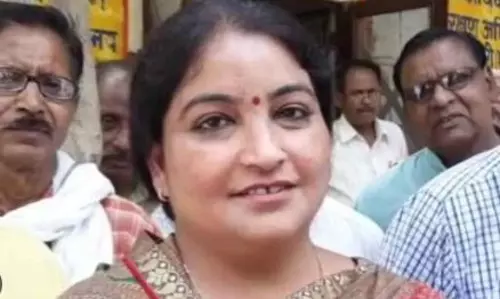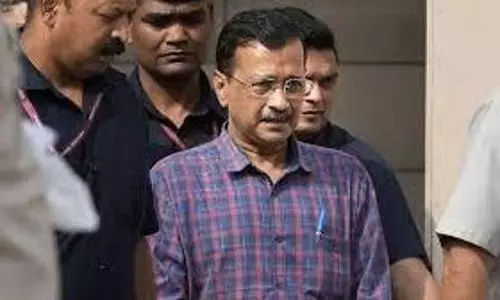

No data available on tribals arrested under UAPA: Union Govt
text_fieldsNew Delhi: Union Minister of State for Home Nityanand Rai on Wednesday informed the Rajya Sabha that 1,948 people were arrested and 34 others were convicted under the stringent anti-terror law Unlawful Activities Prevention Act (UAPA) in 2019.
The Minister was replying to a question by DMK member Tiruchi Siva about the total number of people imprisoned under the country's anti terrorism law.
"As per the report of the National Crime Record Bureau (NCRB) for the year 2019, the total number of people arrested and people convicted under the UAPA in 2019 is 1,948 and 34 respectively," Rai said
On July 27, the Minister had informed Lok Sabha that a total of 09 cases were registered, and 34 persons were arrested by Delhi police under UAPA during the year 2020. The Minister was replying to another question raised by TMC member Mala Roy.
When asked about the names of persons against whom cases have been registered under the UAPA Act during the above period, the Minister refused to disclose the information before Lok Sabha, citing the reason that "disclosure of further details of cases may not be in a larger public interest and added that it "may impact the cases."
On July 29th, when Union Minister of State of Ministry of Tribal Affairs Renuka Singh Saruth was asked about the state-wise details of tribal residents arrested and booked under the Unlawful Activities (Prevention) Act (UAPA) in Rajya Sabha, she replied that "National Crime Records Bureau does not maintain such data". The Minister was replying to a question by INC member from Karnataka, Dr Lankappa Hanumanthaiah in Rajya Sabha.
Instead of details of tribals arrested under UAPA, the Minister shared detailed data regarding the State/UT wise Cases Reported (CR), Persons Arrested (PAR) and the total number of Persons under Trial(PUT) under UAPA during 2017-2019 as obtained from the latest report published by NCRB for the year 2019.
The data shared in Rajya Sabha says that 901, 1182 and 1226 cases were reported under UAPA in the years 2017, 2018 and 2019, respectively. The data also shows that 1554 persons were arrested in 2017) while 1421 and 1958 persons were arrested in 2018 and 2019, respectively. According to the data, 4098 persons remain in jails as under-trial prisoners in 2017, while 4862 and 5645 are under-trial persons in 2018 and 2019, respectively.
While the minister did not reply to the question regarding the steps taken to ensure speedy trial for prisoners under UAPA, NCRB data depicts a conviction rate of 29% under the UAPA. But according to former Supreme Court judge, Justice Aftab Alam, the conviction rate under UAPA is very low than the data shown in NCRB data.
On July 24th, while speaking at a webinar by CJAR titled "Discussion on DEMOCRACY, DISSENT AND DRACONIAN LAW- Should UAPA & Sedition Have A Place In Our Statute Books?", Justice Aftab pointed out that the rate of conviction under UAPA actually comes at 2 per cent, if examined against the total number of cases registered and the total number of persons arrested.
Justice Aftab also added that 'Police Disposal rates' that refer to the pendency of investigation are equally important. Saying that there were 2361 UAPA cases pending trial, 113 were disposed off with conviction in 33 cases, acquittal in 64 and discharge in 16 cases in 2019, he concluded that 29 per cent is actually the conviction rate in terms of the cases disposed off in a single year. Citing NCRB data, he also added that the charge-sheeting rate is at 42.5 per cent and the pendency rate at 77.8 per cent under UAPA.
Apart from Justice Aftab Alam, many other former Supreme Court judges and human rights activists have questioned and criticised the blatant and unreasonable application of the provisions of UAPA in the name of terrorism.
While Anjana Prakash, former Patna High Court judge, opines that the definition of "Terrorist Act" in UAPA is so vague so as the law is susceptible to misuse, former Supreme Court Judge Justice Madan B Lokur has demanded to have a system of compensation and reparation for those who are acquitted after long periods of incarceration under draconian laws like UAPA.
Confirming various criticisms against UAPA, on June 15, while delivering a judgment related to the Delhi Violence Larger conspiracy case, a division bench comprising Justices Sidharth Mridul and Anup Jairam Bhambhani of Delhi High Court had said that 'Terrorist Acts' under UAPA should only deal with matters impacting 'defence of India and not ordinary law and order problems.
Though criticism from the legal luminaries against the draconian law proves the unconstitutionality of UAPA, the Union government and various state governments has been using different provisions of the controversial law to curb dissent and right to protest against the controversial laws passed by government, as happened in the case of those who protested against the controversial Citizenship Amendment Act 2019.
Meanwhile, the Supreme Court is yet to hear the pleas challenging the constitutionality of UAPA filed by Beeyuma, mother of Zakariya from Kerala, who has been imprisoned for the last 11 years charged under UAPA for his alleged role in the blasts that happened in Bengaluru in 2008.























